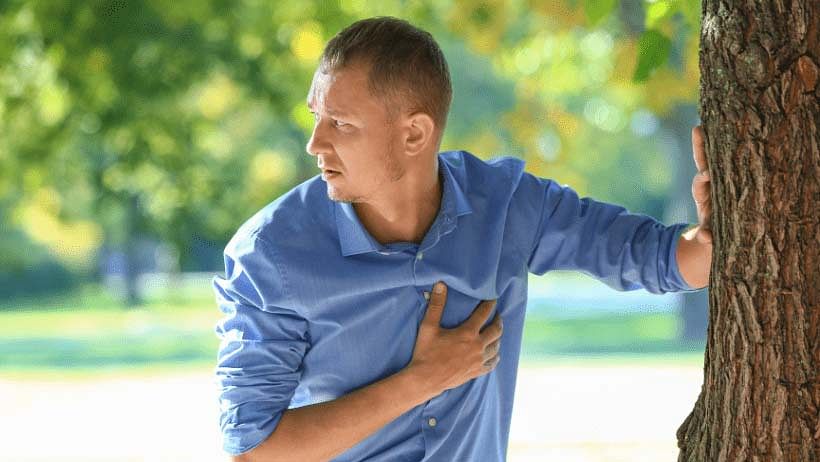Panic Attack and Panic Disorder
Panic Attack and Panic Disorder could be harmful if not diagnosed and treated at an early age. Read on to know everything you need to know about it.

Mental Health refers to how people feel, think, and act. And it aligns with our ability to handle stress and failure. These are very common at a young age, especially with people who often experience panic attacks at night out of sudden fear, and depressive work-life balance.
Let’s learn more in detail, taking note of its symptoms and ways to overcome them.
What is Panic Attack & Panic Disorder?
Panic Attacks are sudden and unreasonable feelings of anxiety and fear; while Panic Disorder refers to when you regularly have sudden attacks of fear and pain.
While discussing panic attack vs anxiety attack, anxiety attacks vary according to the level of intensity- from mild to severe, these prevail for a longer period; while panic attacks come suddenly and generally subside after a few minutes.
Let’s learn about the reason for panic attack causes and its symptoms-
What causes Panic Attacks?
The psychological reason for panic attacks could be several. For instance, chronic stress, phobias from certain objects or properties, low self-esteem, obsessive-compulsive disorder (OCD), or any of the existing mental health conditions like post-traumatic stress disorder (PTSD), anxiety, or depression are few common causes of panic attacks.
A few other reasons for panic attacks could be-
- Medication side effects
- Chronic physical illnesses such as cancer
- Excessive caffeine intake
- Avoiding panic-provoking situations or environments
- Negative self-talk, dysfunctional beliefs, and withheld feelings
Which are the panic attack symptoms?
A few symptoms of a panic attack include - heavy sweating, your heart starts racing, you experience fast and heavy breathing, unpleasant chest sensations, fear of loss of control or death, hot flashes, nausea, abdominal cramping, numbness or tingling sensation, trembling or shaking, feeling of unreality or detachment, among others. These are the signs of a panic attack. However, intense fear or threat may also lead to a panic attack in sleep.
So, is there any med for a panic attack available? How to stop a panic attack? Is panic attack treatment available? If you are looking for answers regarding a panic attack cure, then rejoice, because, yes it is possible!
Panic Attack and Panic Disorder Treatment
The panic attack remedy treatment focuses mainly on eliminating or reducing the symptoms. However, it is advisable to consult professional, certified and highly qualified doctors who can assist you with focus meditation therapy solutions.
Typically, a most worked therapy involved in a panic attack and panic disorder is-
Cognitive Behavioral Therapy (CBT)
This therapy helps you in cleansing your mind and thoughts. It enables and empowers your forward-thinking ability, so you can manage your fear and anxiety.
Besides that, you have to take medications to treat panic disorder. It mainly includes selective serotonin reuptake inhibitors (SSRIs) that keep you calm. Additionally, your prescription may include-
- Paroxetine
- Monoamine oxidase inhibitors (MAOIs)
- Fluoxetine
- Antiseizure drugs
- Serotonin-norepinephrine reuptake inhibitors (SNRIs)
- Benzodiazepines
- Sertraline
Besides the medicinal care, to avoid anxiety and panic attacks, you must also look for panic attack treatment at home. For instance-
- Maintain a proper and well-disciplined schedule
- Take enough sleep to feel relaxed
- Exercise daily
- Avoid the consumption of any stimulants
FAQs
How can I prevent Panic Attack?
Panic attacks could be overwhelming, since it involves physical and emotional symptoms. To prevent panic attacks, you must-
- Practice Mindfulness
- Do deep breathing exercises
- Close your eyes and try to calm yourself down
- Find a focused object
- Picture yourself in a happy place
Who is at risk for developing panic disorder?
Panic disorders often begin in early adulthood or late teens. However, women are more likely to have panic disorders. But, there is no evidence to prove that any individual who suffers from panic attack will become a victim of panic disorder.
What does a panic attack feel like?
A panic attack is an emotion of debilitating and immobilising intensity. You start sweating and breathing heavily. It is good to ask a person who has experienced it personally to understand it better.
How are panic attack and anxiety attack different?
Generally, many people have one or two panic attacks in their entire lifetime, and those stressful circumstances usually come to an end. But, when you experience anxiety and panic attack symptoms regularly, and spend most of the time in constant fear of another attack, it is called panic disorder.
Conclusion: What's the Long term Solution?
As discussed above, Panic disorder is a long-term (chronic) condition. Thus, there’s no guaranteed method to cure it. Some people may respond well to the treatment, while others may not because it is subjective.
However, to control such attacks and disorders, you can also look for home remedies for panic attacks, which include meditation, having a healthy diet, setting a schedule for Aromatherapy, and drinking chamomile tea.
This may help calm you down and ease anxiety. But don’t replace professional help. Follow your appointments religiously and start noticing positive changes in your life!
References:
https://www.healthline.com/health/panic-attack-vs-anxiety-attack#other-treatments
https://www.healthline.com/health/panic-disorder#outlook
https://www.webmd.com/anxiety-panic/guide/panic-attack-symptoms
https://www.healthline.com/health/how-to-stop-a-panic-attack#
https://www.mayoclinic.org/diseases-conditions/panic-attacks/symptoms-causes/syc-20376021#
https://www.nhs.uk/conditions/panic-disorder/
https://www.priorygroup.com/mental-health/panic-attack-treatment/causes-of-panic-attacks

